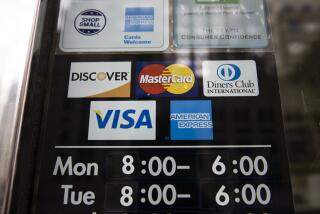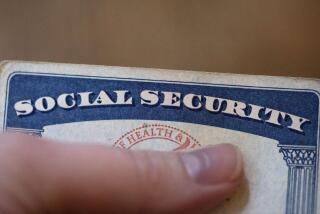Rising consumer debt is good for the economy but not for consumers
Teresa Martin was laid off in October from her job as office manager for a packaging company. The Corona resident is now struggling to pay her bills.
Martin, 57, isn’t carrying any credit card balances at the moment, but she said she may have to start running up debt on plastic in the coming days if she wants to keep a roof over her head.
“It’s scary,” she told me. “But I’m not sure what else I can do.”
As we stagger into a new year, consumer debt is climbing at the fastest pace in more than five years.
IOUs held by U.S. households rose 1.1% in the third quarter to $11.3 trillion, according to the Federal Reserve Bank of New York. That’s the biggest jump since the first three months of 2008.
Meanwhile, student debt continues to pile up as tuition and other higher-education costs become increasingly out of reach for many families.
Outstanding student-loan balances climbed $33 billion to $1.03 trillion in the third quarter, and a record 12% of loans were delinquent 90 days or more, the New York Fed said.
There are two forces at work. Some people, like Martin, are still taking licks from an uncertain economy. They’re going deeper into debt just to survive.
At the same time, many people with a more secure financial footing have rediscovered the pleasures of buying homes and cars and college educations — even though they may not have the money.
In both cases, the result is the same: Consumers are borrowing again.
“The figures are scary because they show people are taking on more debt at a time when jobs are still uncertain,” said Linda Sherry, director of national priorities for the advocacy group Consumer Action.
“It’s dismal to contemplate a life of frugality, and many people are suffering from frugality fatigue,” she said. “Some consumers feel like they should spend it while they have it.”
Donghoon Lee, senior research economist at the New York Fed, said it looked as if consumers had reached “a turning point” in their attitude toward debt.
After slashing overall debt from the record $12.7 trillion in 2008, he said, Americans appear to have decided that they had tightened their belts enough. In economist-speak, that means we’re done with “deleveraging.”
That’s not necessarily a bad thing. Consumer spending accounts for roughly two-thirds of U.S. economic activity. So if people are buying stuff — even with borrowed bucks — the economy is growing.
The question is whether Americans have become better money managers as a result of the recession and subsequent doldrums. Or are we just going to dig ourselves back into a familiar fiscal hole?
Martin, for one, said she doesn’t want to take on more debt. “I’m just not sure what else to do,” she said.
Lenders, for their part, think it’s swell that borrowing is on the rise.
“Consumers have learned the hard lessons of the recession and strive to keep debt at manageable levels,” said Keith Leggett, senior economist with the American Bankers Assn. “Consumer debt is still lower than before the recession, and consumer delinquencies remain significantly below their 15-year average.”
People are clearly feeling comfortable with big-ticket splurges. Auto-loan balances rose $31 billion in the third quarter to $845 billion — the 10th straight quarterly increase. New auto loan originations increased to $97 billion, the highest since the third quarter of 2007.
Outstanding mortgage balances increased $56 billion to $8 trillion in the third quarter, while credit card balances climbed $4 billion to $672 billion.
But Consumer Action’s Sherry sees trouble on the horizon because of the relatively high unemployment rate.
“I’m not so optimistic that everyone will find jobs that pay a living wage,” she said. “It feels wrong that some people — many people — have to work more than one job, or feel they are slaves to a job because it’s difficult to find a new job, let alone a better-paying job.”
To Gail Cunningham, it can be a challenge to resist the siren call of consumerism, especially after having kept your belt tightened for a number of years.
“Access to credit has become more readily available, and plastic is still tempting,” said the vice president of the National Foundation for Credit Counseling.
“Good deals fill the airwaves,” she noted. “What’s good for America’s economy and what’s good for the consumer’s personal economy shouldn’t be at odds with each other. They really need to learn to peacefully coexist.”
As with all things, moderation is the watchword. A little debt may not be a bad thing. A lot of debt can bury you in financial difficulties.
Experts say you’re usually in decent shape if your total debt load amounts to less than a third of your take-home income.
“Credit has never been the problem, but the irresponsible use of credit has wrecked many a financial life, not to mention marriage,” Cunningham said. “The question of how well the lessons of the past were learned remains unanswered.”
Suzanne Martindale, staff attorney for Consumers Union, advised people to use free online tools — most banks and brokerages offer them — to keep a tight rein on their financial habits.
“Saving, in particular, is a great habit,” she said. “It’s never too late to start, and no amount is too little to put away. Declining that extra-large latte once a week and putting the money into a rainy-day fund can really add up over time.”
In fact that might be a New Year’s resolution that’s easier than most to keep.
And you’ll thank yourself for it later.
David Lazarus’ column runs Tuesdays and Fridays. He also can be seen daily on KTLA-TV Channel 5 and followed on Twitter @Davidlaz. Send your tips or feedback to david.lazarus@latimes.com.







